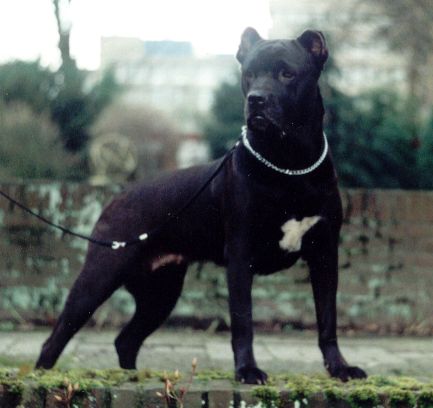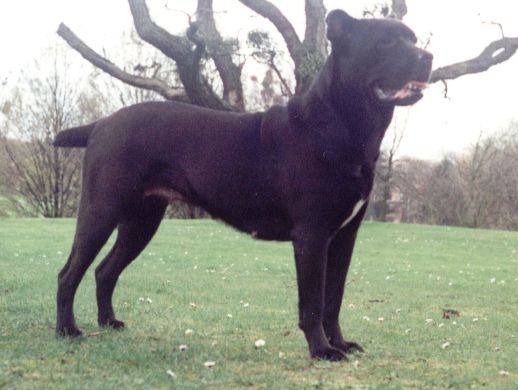|
The
Cane Corso was used in ancient Italy for several things. This
made the Cane Corso a very useful dog, and this is also one of the reasons why
the breed still exists today.
 One
of the uses was the protection of livestock.
In Italy the stock walked free in nature with no fences surrounding the fields.
If an animal walked away too far from the rest of the stock, the Cane Corso
would take action. This way the entire stock was kept together and the farmer
had no trouble finding his stock. The Cane Corso also kept the wild animals like
wolves away from the stock. If
for instance a pig (which were raised in the wild in those days) delivered
piglets, the mother pig would hide herself in a place where the farmer couldn't
find her.
If the farmer was missing a pig, the Cane Corso would locate it and the farmer
could take the piglets with him to his farm. The
mother pig of course didn't like this and wouldn't allow the farmer to take her
piglets without resistance.
The Cane Corso kept the mother-pig at a distance, so the farmer could put the
piglets in a bag and take them to his farm on a horse. The
mother pig would then follow the farmer, so she didn't loose sight of her
offspring.
Once on the farm the mother and her offspring were reunited. The Cane Corso had
done his job. These
are only some of the uses of the Cane Corso on a farm. One
of the uses was the protection of livestock.
In Italy the stock walked free in nature with no fences surrounding the fields.
If an animal walked away too far from the rest of the stock, the Cane Corso
would take action. This way the entire stock was kept together and the farmer
had no trouble finding his stock. The Cane Corso also kept the wild animals like
wolves away from the stock. If
for instance a pig (which were raised in the wild in those days) delivered
piglets, the mother pig would hide herself in a place where the farmer couldn't
find her.
If the farmer was missing a pig, the Cane Corso would locate it and the farmer
could take the piglets with him to his farm. The
mother pig of course didn't like this and wouldn't allow the farmer to take her
piglets without resistance.
The Cane Corso kept the mother-pig at a distance, so the farmer could put the
piglets in a bag and take them to his farm on a horse. The
mother pig would then follow the farmer, so she didn't loose sight of her
offspring.
Once on the farm the mother and her offspring were reunited. The Cane Corso had
done his job. These
are only some of the uses of the Cane Corso on a farm.
 The
Cane Corso was (and still is) used as a guard-dog. For guarding in the night the
black ones were preferred. This
is because a black dog is more difficult to locate in the dark. The
Cane Corso was (and still is) used as a guard-dog. For guarding in the night the
black ones were preferred. This
is because a black dog is more difficult to locate in the dark.
The
Cane Corso was also used for hunting.
Especially
for large game such as boars. For this purpose the lighter-colored dogs were
used, because the hunter could always see his own dog. The Cane Corso would hold
the wild boar while the hunter would finish it off with his dagger. The Cane
Corso has saved many a hunter from the tusks of a wild boar, often putting his own life in danger.
These
are just some examples of the varied uses of the Cane Corso. On our stories
site, you can find some funny example of some utilities.
Up | Italy travels | Utilities | stories | FCI standard
Nancy Koper
canecorsonancy@outlook.it | 


